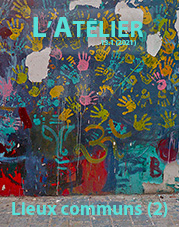Community Plays in Dorchester: How to Find a Common Ground for Theatre?
Abstract
The article explores the genre of the community play as developed since the 1970s in the city of Dorchester by Ann Jellicoe. Community plays are written by a professional playwright commissioned by a local committee. They deal with a part of the history of the city and are performed by its inhabitants. They are consequently built on the idea that sharing a common experience on common ground during the time of the performance, and discovering a common heritage which is rooted in that common ground and explored by those plays, is what shapes the identity and ethos of the community. That community is composed of the hundreds of participants who all live in Dorchester and are building a strong sense of community throughout the creative process. It is then enlarged during the performances so as to include the spectators, thanks to two staging conventions: because the space of the performance does not divide the actors from the audience, and because many among them know each other, being inhabitants of the same ground, participation is ensured in a deeper way than in other immersive theatrical experiments. Concentrating on three plays written over a period of 35 years for the city, the article explores the conditions of the creation of this communal spirit, as well as its limits, wondering whether it really is possible to build an inclusive community on common ground in the 21st century, and whether a model imagined in the 1970s can still be relevant today, without becoming commonplace.
Keywords : community plays, Dorchester, common ground, David Edgar, Stephanie Dale, immersive theatre, participatory theatre, promenade theatre, political commitment, inclusivity
Downloads
Published
Issue
Section
License
- Work submitted for publication must be original, previously unpublished, and not under consideration for publication elsewhere. If previously published figures, tables, or parts of text are to be included, the copyright-holder's permission must have been obtained prior to submission.
- Authors of accepted manuscripts will assign to L'Atelier the right to electronically distribute their article, or publish it in any form (Internet, CD ROM, printed copy) but authors will retain copyright and, after the article has appeared in L'Atelier, authors may republish their text (in print and/or electronic form) as long as they clearly acknowledge L'Atelier as the original publisher.


